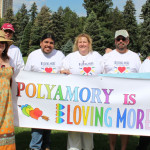 Polyamory sends visions of orgies and free love to most people who first hear the term and definition. Even after careful explanation to the uninitiated, they still walk away thinking polyamory equals f***ing anything that moves. This belief that polyamory is about sex is what send people into a frenzy about morality, commitment and family values. The Montel show did a wonderful show on polyamory but when one of the poly guests compared polyamory love to loving children and the ability to love more than one he made the statement “But I don’t have sex with my children”. In our culture we are sex obsessed and sex phobic. This obsession, according to most people, means sex changes everything.
Polyamory sends visions of orgies and free love to most people who first hear the term and definition. Even after careful explanation to the uninitiated, they still walk away thinking polyamory equals f***ing anything that moves. This belief that polyamory is about sex is what send people into a frenzy about morality, commitment and family values. The Montel show did a wonderful show on polyamory but when one of the poly guests compared polyamory love to loving children and the ability to love more than one he made the statement “But I don’t have sex with my children”. In our culture we are sex obsessed and sex phobic. This obsession, according to most people, means sex changes everything.
American culture is challenged when it comes to sex and this generates much confusion. Sex is an important part of many romantic relationships but it is not the end all and be all. Sex has been equated with romantic love for centuries and, in more recent years, with monogamous marriage and commitment. Sex, love, romance and intimacy are not all the same thing and you can have one without the other.
Polyamory is more about romance and love than sex. The non-poly world just does not seem to get it; it’s not about the sex. Yes, poly relationships include sex but just like monogamous ones people are there for love, romance, intimacy and numerous other reasons. Sex is often an important component but it is not by any means the focus and sometimes it isn’t even there. But it is the sexual component that seems to evoke such passionate reactions to polyamory, swinging and other forms of alternative sexuality.
People are different in so many ways. They have different hobbies, interests, likes, dislikes and we all accept this. One person may love the water and boating and another loves rock climbing and mountaineering. People have diverse work interests, raise their kids a certain way and have preferences on where they live. This kind of diversity is not seen as right, wrong or even surprising in any way. Yet when it comes to sex and romantic relationships, we have this narrow parameter of what is acceptable behavior. We accept change and fluidity in every other aspect of life and then seek to box in love, sex and intimacy, the very things we should expect the most freedom with.
We would never tolerate our personal choices in work or where we live to be dictated by the neighbors or the government and yet, as a culture, we seek to control who a person loves, how they love, what sexual activities are accepted and even how many they can love. Why, one may ask, because of SEX. Gay marriage, gay relationships, bisexual relating, polyamorous relating all include sex and sex scares most people.
 In the sixties and seventies our culture made a shift toward opening up sexually. The ideas of free love, swinging and the one night stand were being explored. Unfortunately so many of the young people exploring had been raised in families that had no communication, where masturbation was forbidden and no one talked about sex. Many were taught good girls were supposed to be pure and hold out their virginity for marriage like a bartering chip. Boys were supposed to push girls into submission. The same people who opened up the sexual revolution of the sixties and seventies also brought in their own bad habits as well as unconscious fears and shame. Many were like a kid in a candy store, enthralled and lacking the self control not to overdo it. Free love instead of coming from a place of love was often coming from a place of rebellion and need to fit in with peers. In many cases people, especially women, were pressured into swinging or sex when it was not right for them. As a culture we lacked the important skills or role models to handle free love.
In the sixties and seventies our culture made a shift toward opening up sexually. The ideas of free love, swinging and the one night stand were being explored. Unfortunately so many of the young people exploring had been raised in families that had no communication, where masturbation was forbidden and no one talked about sex. Many were taught good girls were supposed to be pure and hold out their virginity for marriage like a bartering chip. Boys were supposed to push girls into submission. The same people who opened up the sexual revolution of the sixties and seventies also brought in their own bad habits as well as unconscious fears and shame. Many were like a kid in a candy store, enthralled and lacking the self control not to overdo it. Free love instead of coming from a place of love was often coming from a place of rebellion and need to fit in with peers. In many cases people, especially women, were pressured into swinging or sex when it was not right for them. As a culture we lacked the important skills or role models to handle free love.
 Sex has been demonized, used as a weapon and made a sin, first by the church and now by society. People have suffered terrible shame, guilt and even pain about their sexual nature and their sexuality. These ideas about sex as sinful can wreak havoc on the unconscious mind and sabotage people’s attempts to free themselves and embrace their sexual nature. Part of this cultural programming is that when we “really” love someone we should only want sex with them. We are only allowed to experience this naughty pleasure in the boundaries of a “committed monogamous relationship”. This originally comes from religion and yet people, who have a completely different set of beliefs and values, from atheists to pagans, continue to perpetuate this boundary.
Sex has been demonized, used as a weapon and made a sin, first by the church and now by society. People have suffered terrible shame, guilt and even pain about their sexual nature and their sexuality. These ideas about sex as sinful can wreak havoc on the unconscious mind and sabotage people’s attempts to free themselves and embrace their sexual nature. Part of this cultural programming is that when we “really” love someone we should only want sex with them. We are only allowed to experience this naughty pleasure in the boundaries of a “committed monogamous relationship”. This originally comes from religion and yet people, who have a completely different set of beliefs and values, from atheists to pagans, continue to perpetuate this boundary.
We as a culture exalt romantic sexual love to this sanctified realm. We say it is different from love for friends, siblings, parents and children. That because of the sexual component it has to be limited and you can only share this activity with one person. But as many people understand, and studies have shown, we are really talking about lust and it fades over time. The maddening lust of new relationships is replaced with long term love more akin to love of family and friends, though often deeper because of the deeper intimacy sex can bring in a relationship.
We know people are able to love many people. Sex is one component of a vast array of ways in which people connect. Why is it so hard to make the leap that people who love someone deeply, are committed to that connection and have a sexual relationship could also love another person as well and in the same way. Human beings do it all the time, they have an affair, they go from one relationship to another, often overlapping, and they often still have strong feelings for past lovers.
Perhaps this is why, in the end, polyamory is so damned scary for many people. Polyamorists admit the truth; they romantically and sexually love more than one person. They choose to do so honestly and openly despite the possible repercussions of lost jobs and threats to their children. Polyamorous people embrace what many people already feel but are afraid to acknowledge; love is free flowing and abundant.
 Many poly people do get the opportunity to explore and embrace their sexuality. When the boundaries are removed within the support of a loving committed relationship then there is the opportunity to explore what excites you and what gives you pleasure without losing your lover. You can deepen intimacy through honesty and working your way past jealousy and insecurity. You can remain open to love, connections, attractions and become an explorer of your own sexual nature and what intimate relationships really mean for you. It is challenging, exciting and at times risky. You risk being hurt, being rejected, trying things that scare you and losing people you love. You can gain personal growth, insight, living life to the fullest and an abundance of love and relationships to share and/or dance in and out of your life. It is not easy and not for everyone.
Many poly people do get the opportunity to explore and embrace their sexuality. When the boundaries are removed within the support of a loving committed relationship then there is the opportunity to explore what excites you and what gives you pleasure without losing your lover. You can deepen intimacy through honesty and working your way past jealousy and insecurity. You can remain open to love, connections, attractions and become an explorer of your own sexual nature and what intimate relationships really mean for you. It is challenging, exciting and at times risky. You risk being hurt, being rejected, trying things that scare you and losing people you love. You can gain personal growth, insight, living life to the fullest and an abundance of love and relationships to share and/or dance in and out of your life. It is not easy and not for everyone.
Sex is a beautiful and natural expression of love and affection and it is good for you. We have made it into something fearful and shameful rather than celebrating the joy. The simple truth is polyamory has nothing and everything to do with sex. Polyamory is at the core, about loving romantic relationships. These relationships usually include sex but can also embrace deep intimate and romantic friendships without sex. They can be fabulous networks of sexy connections. They can also be a family with children and multiple parents; raising kids, sharing a home, doing chores and watching TV, hoping they might have time to squeeze in a little sex play between bedtime stories and passing out for the night. They are no different and no more about sex than any other relationship style.
Most poly people have experienced the phrase “But if you’re poly, you should have sex with me”. While I might want to yell “It’s not about the sex” the truth is, I am polyamorous and I am also picky. Just between you and me, with the kids, the house and balancing relationships, if I can find time I am much more interested in spending quality time with the partners I love then exploring sex with a random person I feel no connection with.








one love!
I thank you from deep inside of all of me for this article. thank you also for all the work that you do and have done for so long. Sharing your personal journey into poly with us is very courageous and encourages the rest of us to free ourselves too. I am personally seeking information about triad specifically the closed vee fmf types. I enjoy your website and I feel comforted by your words.
I hope to attend one of your conferences someday soon.
thank you again.
Dear Editor,
We loved this site and will be linking to it from our yahoo groups site. Please notify me of any 2011 planned events or conferences. My husband and I enjoy a very healthy, open relationship. Plus we each have another lover that we spend time together with, both seperate and apart. Recently I ran for a municapality office and was warned by many that my open marriage could come up as an issue. Thankfully it did not. However, much of the information here is so useful and I would like to become a member, if there is a membership.
Thanks you so much for the information,
Carol
My husband recently came to me asking me to look into a polyamorous lifestyle. He’s met someone who he feels a strong connection to and would like to be able to explore this with her. I know they are in love with each other and to be honest I am really in turmoil about the whole thing. My husband swears his love for me has not and will not ever change. He’s quite convinced that he will be a better husband to me if I can open myself up to the possibility of living this lifestyle. Currently they are not involved sexually, at my request, but I know that even though it’s a small part of the whole dynamic of the relationship, at some point he’d like for me to be okay with him being sexually intimate with her. I am trying to open my mind to this possibility, but it just make me absolutely crazy to think about it. What makes this even harder on me is that I don’t really like this person he wants to be with. I’m desperately trying to find other women I can connect with who have also been through this kind of thing and have come out on the other side with a better acceptance and understanding of this lifestyle. I want my husband to be happy, but I cannot figure out how to do that without making myself crazy. I feel so tormented by this and I would sincerely love to be able to talk to women who have been in my situation where their husband wanted to live this lifestyle and they struggled to accept it. I want to know how they got over the jealousy and the fear and were able to find peace in it all. I really would like to be open to this, but it’s been an emotional rollercoaster for me and I am just having trouble finding some peace. I’ve been pouring over the internet looking for chat rooms, blogs, ANYTHING that might get me in touch with women like this and I’ve had no luck. I am hoping, quite sincerely, that maybe by posting a response on here that I could be connected to some kind of support group who could maybe help me overcome the jealousy and the fear. Any website, blogs, chats that you could steer me to, even books, would be most appreciated. I’d like to be able to move on from this, give myself the peace. Marcie
This is a bit late for a reply, but I just got the comments in my RSS feed.
Marcie:
If you are still looking for something to help you through the jealousy aspect of polyamory, I suggest reading _The Ethical Slut_, by Dossie Easton and Catherine Liszt. Though this is a book that’s really directed more at open relationships than triad or fork relationships, it does deal directly with the jealousy aspect, and I found that it helped me tremendously when my wife was involved in a side relationship with a man I didn’t get along with well. (Note that I’m male, and you were asking for women’s perspectives, but I think the feelings you are experiencing are universal. Note also that the book mentioned above is written by women.)
One thing that concerns me about your situation is that your husband came to you after he had already met someone, rather than the two of you discussing polyamory before entering into anything. I’m glad to hear that he was open with you about his interest, but it puts you in a difficult position, because you are, in effect, being forced into a decision about whether you want to pursue a poly lifestyle after he’s already decided that he wants to. If you decide that you don’t want to pursue this lifestyle, it could mean the end of your marriage. If you decide to jump in without really wanting to, you are not being true to yourself and are setting yourself up to be hurt. It’s not a fair position for you to be in, and he needs to realize and acknowledge that.
I hope this late reply helps you in some way. Be well.
This is hands down the best article I have ever read from the hippie point of view, on this topic. I’m a (very horny) guy and I agree with everything you say about love vs. sex.
However, embracing the love/romance side of things was the last phase of my journey. Just as women where pressured into orgies and the like, I have always felt, (prematurely) forced into sweet romance.
How about we settle for this:
These relationships usually include sex, but not always.
These relationships usually are romantic, but not always. I.E. they can be based only on sex, and that’s OK, too.
The social stigma that a naughty element invites, is inevitable. Yin …Yang
Just as.
Compersion……..Cuckold.
just as
Polyamory………Gang Bangs and Hookers.